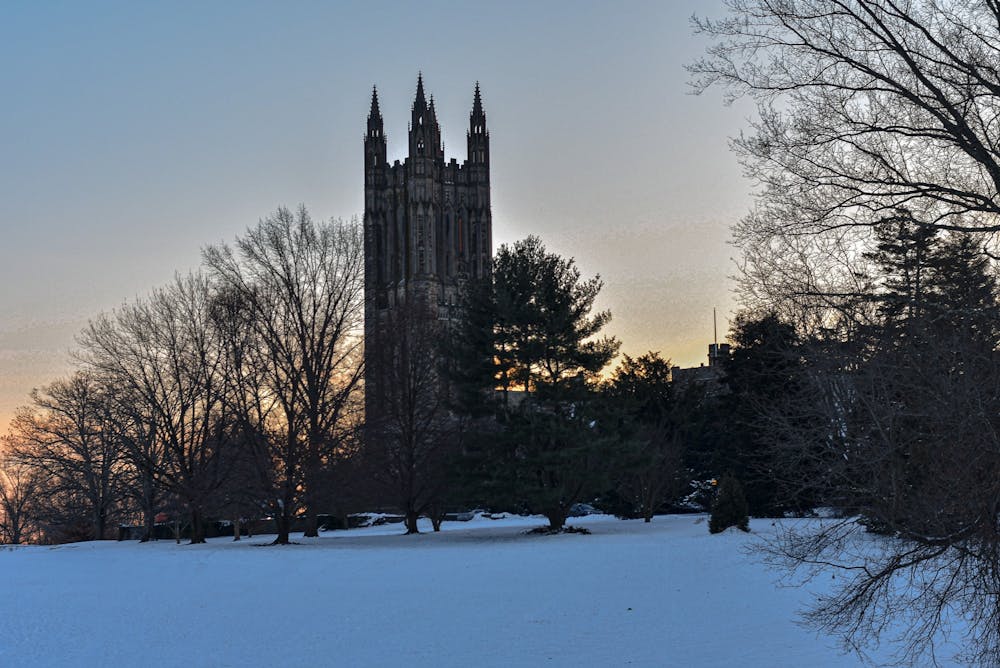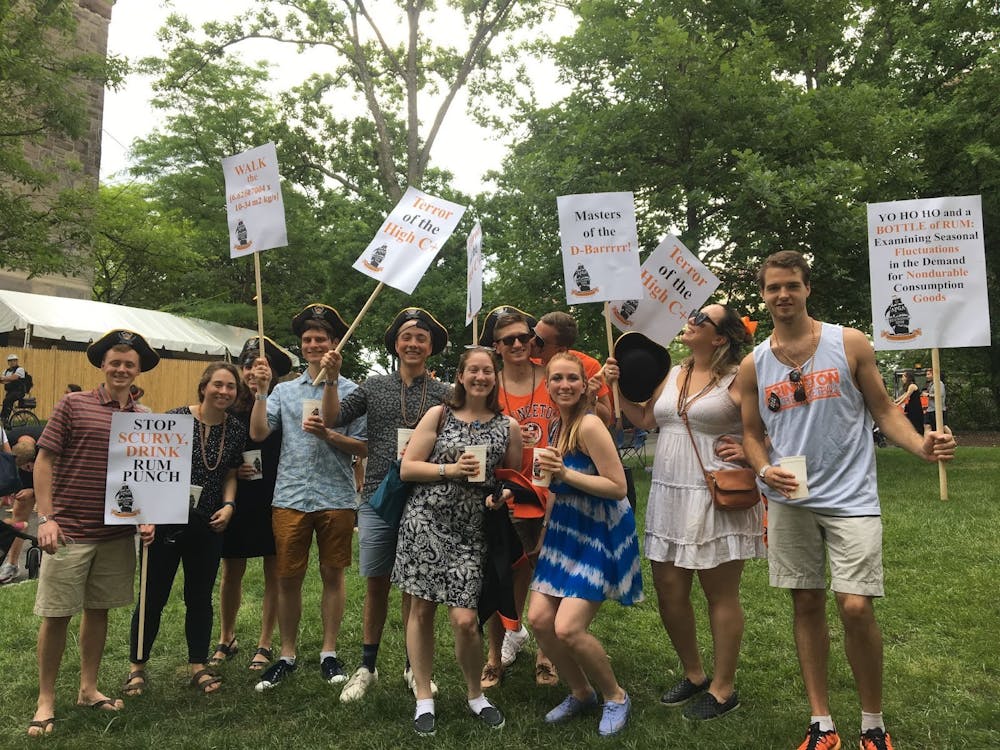From weekend parties to meals in dining halls to extracurricular opportunities, Princeton undergraduates have many resources to turn to when they want to meet new people or spend time with familiar faces. Indeed, the close-knit undergraduate experience is often listed as one of the draws of the University to prospective applicants, particularly the statistic that 98 percent of undergraduates live on campus.
But for graduate students, the Orange Bubble looks and feels different. With limited and often arbitrarily assigned residential spaces, meager options for socializing, and a narrow dating pool, some graduate students feel alienated from University life — while others have found pockets of community and exciting ways to engage, especially as Princeton emerges from COVID-19 restrictions.
“Grad and undergrad are very separate here,” said Mauro Windholz, a third-year graduate student. “My roommate goes to 2D [a food coop] … but I’m not a member, so anytime I have socialized with undergrads it is with him.”
While the vast majority of Princeton undergraduates get the on-campus residential experience Princeton lauds, graduate students’ living situations are far more varied. Housing is not guaranteed for all graduate students, and priority is given to first-year students and decreases as students progress through their degree. Students’ social experiences are heavily influenced by which of the University’s eight “on-campus” housing options they live in.
Ross Teixeira GS discussed the Old Graduate College, reflecting on the social structure it cultivates.
“If you live in the grad college, it’s much more common that people meet bumping into each other at dinner or in the hallway,” he said. “I was always in the apartments, so I never really met people like that.”
“I used to live in the grad college,” said Windholz. “There are plenty of opportunities for socialization there.”
The Princeton Graduate Debasement Bar (DBar) is a popular spot among the students living in the Old Graduate College. DBar is located in the basement of the Old Graduate College and serves “resident and non-resident members of the graduate college.”

“The bar in the basement is great because it makes socializing really accessible,” said Tom Postma GS.
Graduate students also frequent Ivy Inn, a “no frills bar” on Nassau Street.
“In terms of going out, Ivy Inn and DBar are definitely the most poppin’,” said Isaac Christian GS.
Christian discussed events and activities sponsored by the Graduate Student Government (GSG), including formals and weekly happy hours often sponsored by DBar. In the fall semester, Christian DJ’ed for the Graduate Student Formal.

“DJ’ing the formal was a banger,” said Christian. “And nowadays there is something to do every single weekend. I sponsor the socials in the grad college, leading the social charge, sending out creative emails and setting up the drinks.”
Teixeira elaborated further on events sponsored by GSG, stating, “typically, when there aren’t COVID restrictions, there are the monthly parties hosted at Campus Club and a ball twice a year, plus weekly social hours and happy hours.”
Cara Turnbull GS reflected on events sponsored by GSG, commenting that they can be inaccessible to students who live off campus.
“There aren't a lot of ways to get to campus,” said Turnbull. “A lot of the events center around drinking and free drinks, so when you live far, that can be tricky with driving. It’s nicer living downtown in Princeton, but even then, it is a 30-minute walk to DBar, and the buses can be difficult to use.”

Graduate College.
Angel Kuo / The Daily Princetonian
Even as large graduate student-organized events begin to return, some students are opting for smaller social gatherings in light of the ongoing pandemic and ever-changing guidelines.
“I mostly go to small dinner parties, either in someone’s house or going out to eat, when public health allows for that sort of thing,” said Jenny Beck GS.
Distance from campus and public health concerns aside, graduate student social life is complicated by another factor: the reality of a broad spectrum of life experiences and living situations. While some graduate students are married and have children, others only recently completed their undergraduate programs. And when it comes to romantic lives, those differences are felt all the more.
Beck began her graduate career at Princeton married, and “felt a little strange” being one of few married students in her program.
After her divorce, she began using dating apps.
“I would switch my location to New York or Philadelphia for dates — there aren’t a lot of people to meet in Princeton,” Beck said.
“It’s challenging to date in grad school in general,” Christian agreed. “So many people already have a significant other, and they are spending less time with a solid group of friends.”
Teixeira noted that however small the Princeton dating pool may seem, there are even fewer LGBTQ+ dating prospects in the area. “It takes a lot of luck,” said Teixeira, who now lives in Philadelphia and commutes to campus. “It can lead people to leave campus.”
Many graduate students do not consider dating undergraduate students due to their different stages of life and circumstances.
“There’s a difference in culture between undergrad and grad school,” said Teixeira.
But some romantic relationships between graduate students and undergraduates have been successful.
“I know people who are with grad students,” said Rachel Chen ’24. “And sometimes my friends see the grad students come up on Tinder or other apps like that and will meet up.”
Many graduate students are interested in becoming more involved in the greater Princeton community beyond individual social relationships with fellow students and peers. However, these graduate students have had difficulty taking part in events, activities, and traditions dominated by undergraduates and regulated by the Office of the Dean of Undergraduate Studies (ODUS).
“The general frustration of grad students on campus with regards to social things is that campus social life is tailored so heavily towards the undergrads. It feels separate,” Teixeira said. “Some groups do it better, like some affinity groups. But sports, theater, a cappella … some of those groups don’t even allow grad students to join.”
Teixeira clarified that while there are certainly groups that do accept graduate students, the undergraduate focus can make such activities harder to join and difficult to navigate socially.
“I think there is a lot of bias and legacy in the admissions process into these groups, so it seems like there is a kind of unwillingness to admit grad students into these groups,” Teixeira said. “If you are admitted, it can create a strange dynamic where you are the only grad student hanging out with a ton of undergrads.”
Some graduate students, barred from pursuing their interests on campus either by the constraints of undergraduate life or cultural differences, seek out social activities in New York City or Philadelphia.
“I miss Forro, a kind of partner dance we do in Brazil. I’ve looked at events in New York. It’s not something that I can do with people here,” said Windholz.
Ultimately, the graduate students who spoke with The Daily Princetonian said they felt they have a lot to be grateful for within their Princeton social experience — despite the difficulties posed by the University’s undergraduate focus.
“I feel really lucky to be at Princeton and to have that stability and my close community of colleagues and friends,” Beck said.
Christain agreed, reflecting on how his graduate school social experience has impacted him outside of academics.
“Something I’ve learned at Princeton is that having all these different people around me has made me a better person,” he said.
Sydney Eck is an associate Features editor and Prospect staff writer for The Daily Princetonian. She can be reached at seeck@princeton.edu.








